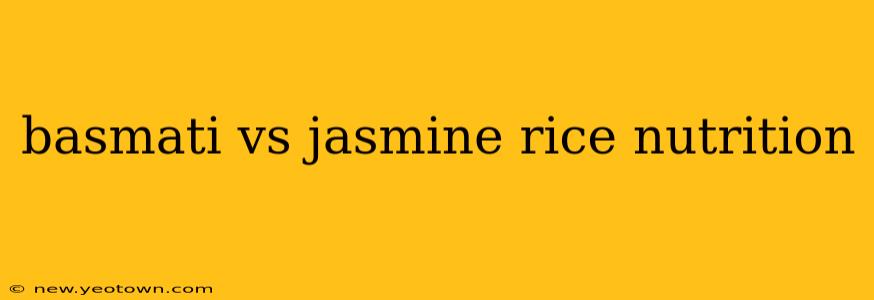Rice, a staple in countless cuisines worldwide, comes in a dizzying array of varieties. Two of the most popular and often compared are basmati and jasmine rice. While both boast delicate flavors and fluffy textures, they subtly differ in their nutritional profiles. This deep dive explores the nutritional battle between basmati and jasmine rice, answering common questions and helping you make informed choices for your diet.
Imagine two chefs, each presenting their signature rice dish. One, a master of Indian cuisine, showcases fluffy, fragrant basmati rice, its long grains glistening. The other, a Thai culinary artist, presents a plate of subtly sweet jasmine rice, its grains shorter and more rounded. Which rice reigns supreme in the realm of nutrition? Let's find out.
Basmati Rice Nutrition Facts
Basmati rice, originating from the Indian subcontinent, is prized for its distinct aroma and long, slender grains that separate beautifully when cooked. Nutritionally, one cup of cooked basmati rice (approximately 195 grams) typically offers:
- Calories: Around 205-210
- Carbohydrates: Approximately 45-50 grams, mostly complex carbohydrates.
- Protein: About 4-5 grams.
- Fiber: Around 1-2 grams.
- Fat: Negligible.
Basmati rice is a good source of manganese, a mineral essential for bone health and metabolism. It also contains small amounts of other nutrients like magnesium, selenium, and phosphorus.
Jasmine Rice Nutrition Facts
Jasmine rice, a fragrant staple of Southeast Asian cuisine, is known for its soft, sticky texture and slightly sweet flavor. A cup of cooked jasmine rice (approximately 195 grams) usually provides:
- Calories: Roughly 200-210.
- Carbohydrates: Approximately 44-48 grams.
- Protein: About 4 grams.
- Fiber: Roughly 1-2 grams.
- Fat: Negligible.
Similar to basmati rice, jasmine rice offers small amounts of essential minerals like magnesium, phosphorus, and potassium. However, it may contain slightly more thiamin (vitamin B1) than basmati.
Is Basmati Rice Healthier Than Jasmine Rice?
The difference in nutritional content between basmati and jasmine rice is subtle. Neither rice is significantly "healthier" than the other; the choice often comes down to personal preference and culinary application. Both are primarily sources of carbohydrates, providing energy but relatively low in protein and fiber compared to other grains like quinoa or brown rice.
What are the Glycemic Index Differences Between Basmati and Jasmine Rice?
The glycemic index (GI) measures how quickly a food raises blood sugar levels. Both basmati and jasmine rice have a moderate to high GI, meaning they can cause a relatively rapid increase in blood sugar. However, the exact GI can vary depending on the cooking method and the specific type of rice. Individuals with diabetes or insulin resistance should consume these rice varieties in moderation and as part of a balanced meal that includes protein and healthy fats to help slow down glucose absorption.
Which Rice is Better for Weight Loss?
Neither basmati nor jasmine rice is inherently better or worse for weight loss. Weight management depends on overall calorie intake, not just the type of rice consumed. Both types of rice are relatively calorie-dense, so mindful portion control is crucial if you are aiming to lose or maintain weight. Choosing brown rice, which is higher in fiber, might offer a slight advantage in promoting satiety and potentially aiding weight management due to its slower digestion and higher fiber content.
Are There Different Types of Basmati and Jasmine Rice?
Yes, there are variations within both basmati and jasmine rice categories. For example, you might find different levels of processing, leading to variations in nutrient content and texture. Some basmati and jasmine rices are parboiled, a process that enhances nutrient retention, whilst others are processed differently. Always check the packaging information for specific details.
Ultimately, the "best" rice depends on individual needs and preferences. If aroma and fluffy texture are your priorities, basmati may be your choice. If you prefer a softer, slightly sweeter texture, then jasmine rice is a delightful option. Either way, incorporating both into a balanced diet won't necessarily lead to significant nutritional differences.

